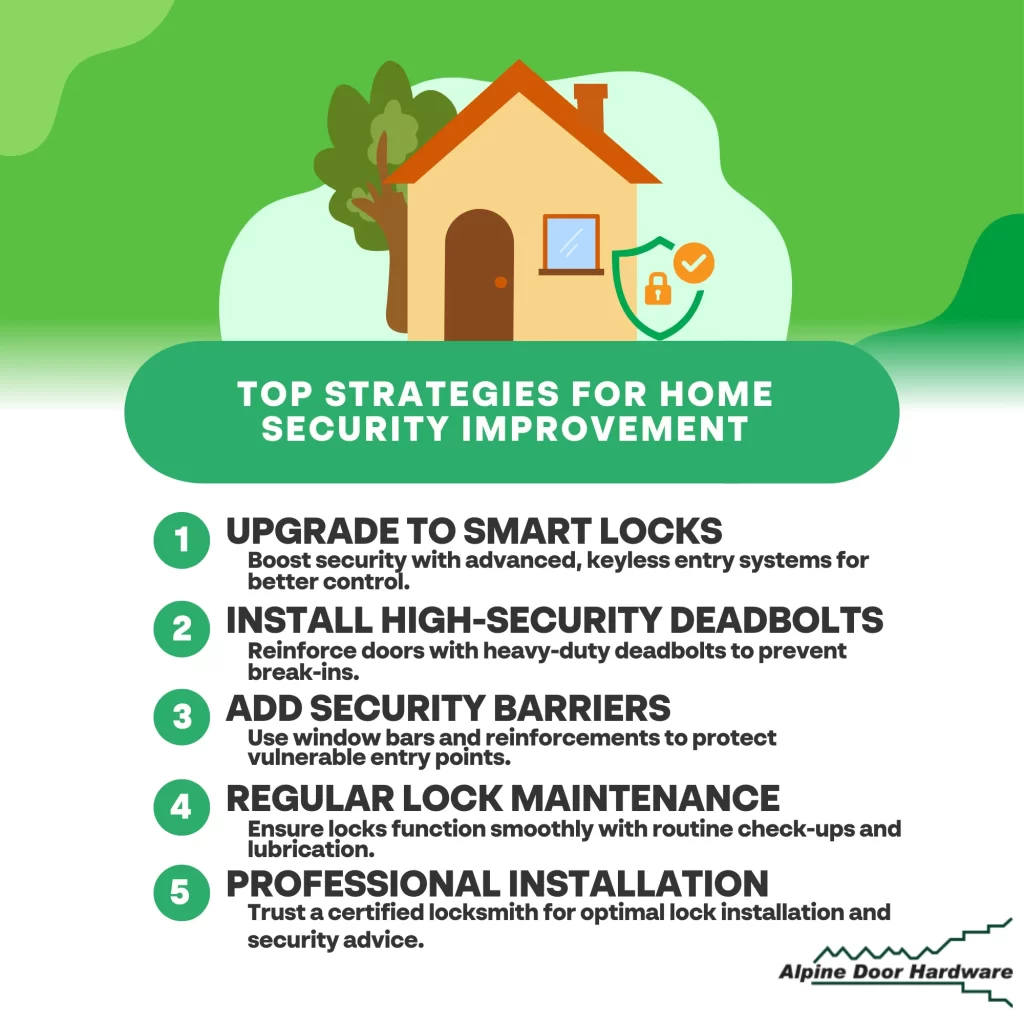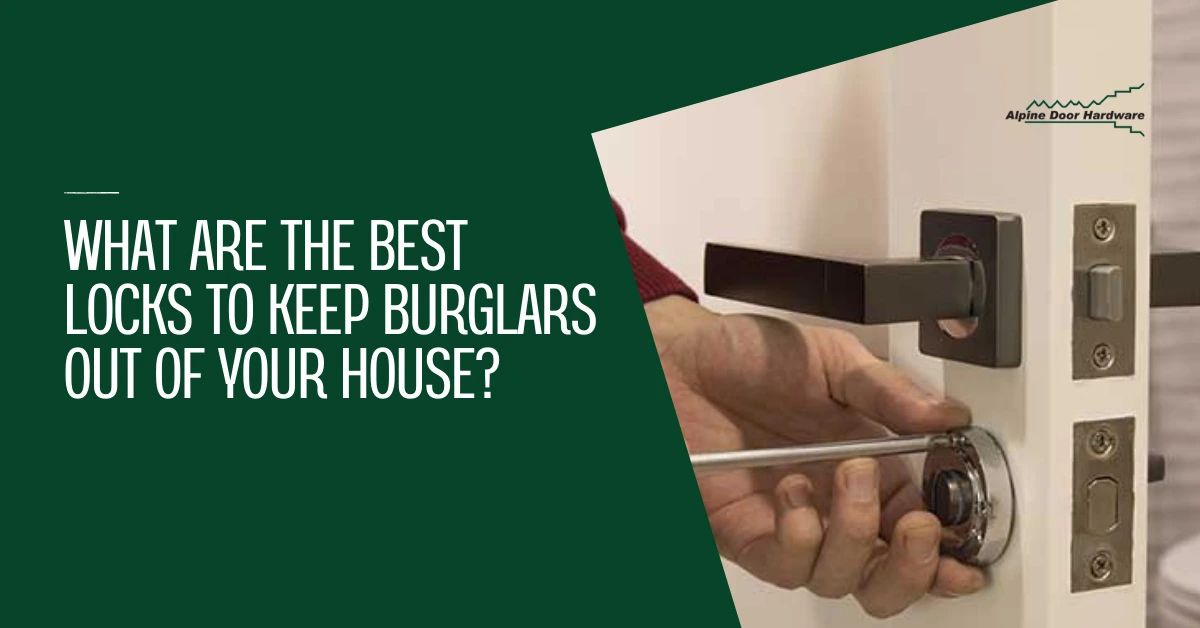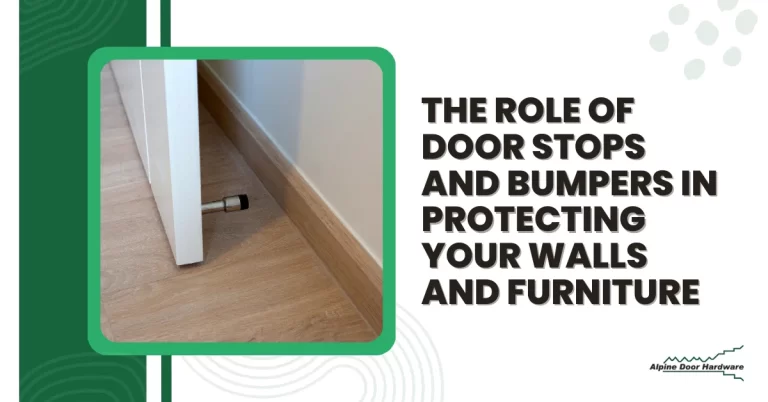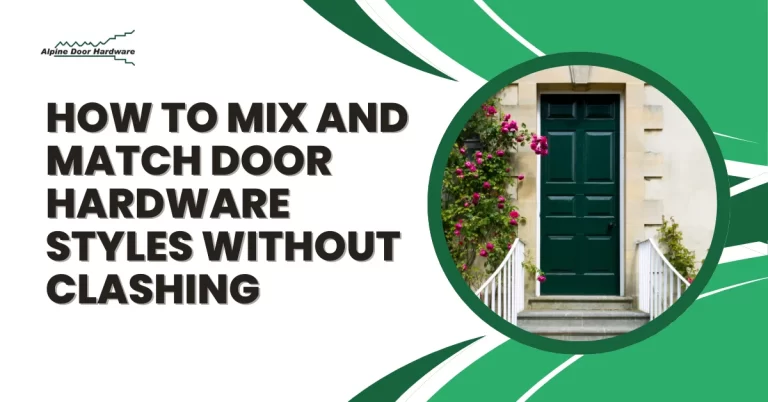To fortify your home against burglars, the quality and type of locks you choose is paramount. With their manual disengagement feature, deadbolt locks offer superb security and are tough to force open. Keypad locks, providing keyless entry and programmable codes, offer high-level convenience and security. Yet, no lock can deliver full-proof protection. Incorporating traditional security measures like bars, bolts, and chains can add an additional layer of security. Ideally, a blend of robust deadbolts, smart keypad systems, and time-tested physical barriers will provide the best protection. Discover more about these lock types and their unique benefits further on.

Key Takeaways
- Deadbolts, especially single cylinder ones, offer superior security for residential doors due to their manual disengagement design.
- Mortise locks, though requiring professional installation, provide better security as they are installed into a pocket in the door.
- Keypad locks enhance security by eliminating the risk of physical key theft and allowing programmable access codes.
- Interconnected locks, combining a doorknob and deadbolt, provide an added level of security against intruders.
- Traditional security measures like door bars, high-quality bolts, and chains offer additional protection.
Doorknob Locks
Doorknob locks are an essential element in door hardware. They’re your first line of defense against intruders, and their effectiveness depends largely on their quality and installation. You’ll find them in various types: cylindrical, mortise, and interconnected.
Cylindrical doorknob locks, the most common type, are relatively easy to install and operate. They’re built into the doorknob and locked from the inside with a button or turn knob and from the outside using a key. However, they aren’t as secure as other types.
Mortise locks, on the other hand, are sturdier and provide better security. They’re installed into a pocket or ‘mortise’ in the door edge, making them harder to pick or force open. But they’re more complex to install and usually require a professional.
Interconnected locks combine a doorknob lock and a deadbolt. They provide added security, but remember, we’re not getting into deadbolts here.
When choosing a doorknob lock, consider factors like door thickness, backset measurement, and the lock’s security grading.
Deadbolts
Don’t underestimate the power of **deadbolts88 when enhancing your home’s security. They’re a formidable line of defense against unwanted intruders. With their unique design, deadbolts provide a higher security level than standard doorknob locks.
Unlike spring bolt locks, deadbolts don’t retract by pressure. Instead, you need a key to manually disengage it, making it considerably harder for burglars to jimmy open. For this reason, it’s essential to focus on the quality of your deadbolt.
For most residential doors, opt for single-cylinder deadbolts, but consider double-cylinder deadbolts if your door has glass near the lock.
Moreover, the strength of a deadbolt lies in its installation. Even the highest-quality deadbolt can’t protect your home if it’s poorly installed. It’s ideal to have a professional do it or, if you’re a DIY enthusiast, confirm that you follow installation instructions accurately.
Keypad Locks
As you ramp up your property’s security, consider shifting to keypad locks. This type of lock is a solid choice for enhanced security. No physical key is needed, eliminating the risk of losing keys or having them stolen. You simply enter a secure code to access the door.
Keypad locks are often programmable, allowing you to set and change codes as you see fit. You can create temporary codes for guests or service providers, then delete them once they’re no longer needed. This flexibility provides additional control over who has access to your property.
Moreover, many keypad locks come with built-in alarms that activate when someone repeatedly enters the wrong code, deterring potential burglars. They can also be integrated into your home’s broader security system for a thorough protection plan.
However, like any technology, keypad locks aren’t invincible. They’re susceptible to hacking, especially if you don’t regularly update your codes. As a result, it’s crucial to pair them with other security measures.
Bars, Bolts, and Chains
While keypad locks offer a solid line of defense, enhancing your home security doesn’t stop there.
It’s time to evaluate bars, bolts, and chains. They’re not glamorous, but they’re effective and reliable, providing an additional layer of security that can deter even the most determined intruders.
Door bars are physical barriers that reinforce your door from the inside. They’re adjustable and easy to install, and can withstand a great deal of force.
Even if a burglar manages to pick your lock, they’ll still have to contend with this robust barrier.
Bolts, specifically deadbolts, are a must-have. They’re more resistant to picking, drilling, and forceful entry than standard door locks.
Confirm you’re using a high-quality, high-security deadbolt. It’s not the place to skimp.
Finally, door chains provide a way to partially open your door while still maintaining some security.
They’re not as strong as bars or bolts, but they allow you to interact with someone at your door without fully exposing yourself or your home.
Don’t underestimate these traditional security measures.
They’ve stood the test of time for a reason.
Frequently Asked Questions
What Are the Most Trusted Brands for Home Security Locks?
You’re likely to trust brands like Schlage, Yale, and Kwikset for home security locks. They’re renowned for their quality, durability, and advanced technology, providing you with superior security to keep your property safe.
How Frequently Should I Replace or Upgrade My Homes Locks?
You should regularly assess your home’s locks, ideally every few years. If they’re showing signs of wear, it’s time to upgrade. Remember, technology advances quickly, so newer models may offer better security.
Are There Any Locks Specifically Designed for Double Doors or Sliding Doors?
There are locks made for double and sliding doors. You’ll find double cylinder deadbolts for double doors and patio door locksets for sliding doors. They’re designed to provide extra security and peace of mind.
What Are the Benefits of Using Smart or Biometric Locks for Home Security?
Smart or biometric locks enhance your home security considerably. You’ll appreciate their keyless convenience, remote access, and unique user codes. They’re harder to pick and can’t be accessed with stolen or lost keys. It’s a smart investment.
Does the Installation of High-Security Locks Require Professional Assistance?
Like solving a complex puzzle, installing high-security locks often requires a professional’s touch. They have the tools and expertise to guarantee your lock fits perfectly, enhancing your home’s security and peace of mind.
Conclusion
To summarize, safeguarding your home isn’t a one-size-fits-all strategy. It’s about arming your doors with a mix of doorknob locks, deadbolts, keypad locks, and bars, bolts, and chains. But remember, the hardware is only as steadfast as its manufacturer. So, choose wisely, and don’t skimp on quality. After all, your home’s security is no place to cut corners. With the right locks, you’ll sleep like a log, knowing your fort is well-secured.




